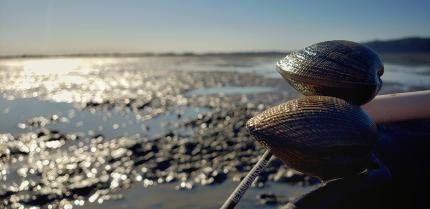
Refer to our 2025 clam, mussel, and oyster news release for details on this year's seasons.
Clam, mussel, and oyster harvesting seasons vary by beach. For size and harvest limits, please see statewide shellfish and seaweed rules.
For at-a-glance, site-specific harvest seasons, please see the two-page 2025 Puget Sound clam, mussel, and oyster season (PDF) guide. Beach seasons can also be found by using the search tool on this page.
A list of the tides in the Puget Sound region that favor good harvest results can be found in the one-page 2025 best clam and oyster harvest tides (PDF) chart.
Harvesting shellfish legally and safely
WDFW works closely with DOH to ensure safe, legal harvest of shellfish on state beaches.
In order to safely and legally harvest shellfish for human consumption, both the DOH health status and the WDFW season for a public beach must be OPEN.
| DOH status | WDFW season | Harvest status |
|---|---|---|
| Open | Open | Safe and legal |
| Open | Closed | Illegal |
| Closed | Open | Not safe |
| Closed | Closed | Not safe and illegal |
Current water quality information, beach locations, harvest seasons, and health advisories can be found by searching for the beach name in the search tool on this page, or by visiting the Washington State Department of Health's (DOH) shellfish safety interactive map.
Identical information is found on WDFW beach pages and the shellfish safety map, but it may be easier to search geographic areas of interest using the map tool. The shellfish safety map also provides links to the detailed WDFW page for each beach.
Shellfish gathering tips and identification
Learn more and find shellfish gathering tips, including gear lists, in this 5-part blog series:
- Steamer clams (Manila and native littleneck)
- Butter clams and Horse clams
- Cockles and Eastern softshell clams
- Geoduck
- Oysters, including tips on how to remove them from their shells (shuck)
- Or visit our "Wild Eats" webpage for clam and shellfish recipes.
For help identifying clam, mussel, and oyster (bivalve) species, download our shellfish identification chart (PDF).
More detailed information about clam and oyster species may be found by visiting the Species in Washington section of this website.
Shellfish gathering rules
For detailed rules, review the Shellfish/Seaweed Species Rules in the Washington Sport Fishing Regulations.
Each recreational shellfish harvester must use a separate container and must be actively participating in shellfish gathering. Digging equipment may be shared.
Unfilled clam gathering holes and sediment piles can damage habitat and kill clams. Clam harvesters must refill holes created while digging. To reduce clam mortality, please push any undersized or discarded clams into the refilled holes.
In Washington, private tidelands owners and their families may have their own shellfishing rules for their lands. Treaty tribes also reserve rights to harvest shellfish on most tidelands and beaches.
Shellfish Treaty Rights FAQ
Visit the Northwest Indian Fisheries Commission’s frequently asked questions page for information regarding tribal rights to harvest naturally occurring shellfish on public and private tidelands in the Puget Sound and Hood Canal regions.
Find a beach
To find a beach to harvest clams, mussels, and oysters, enter all or part of a beach name and/or select a county from the dropdown menu below.